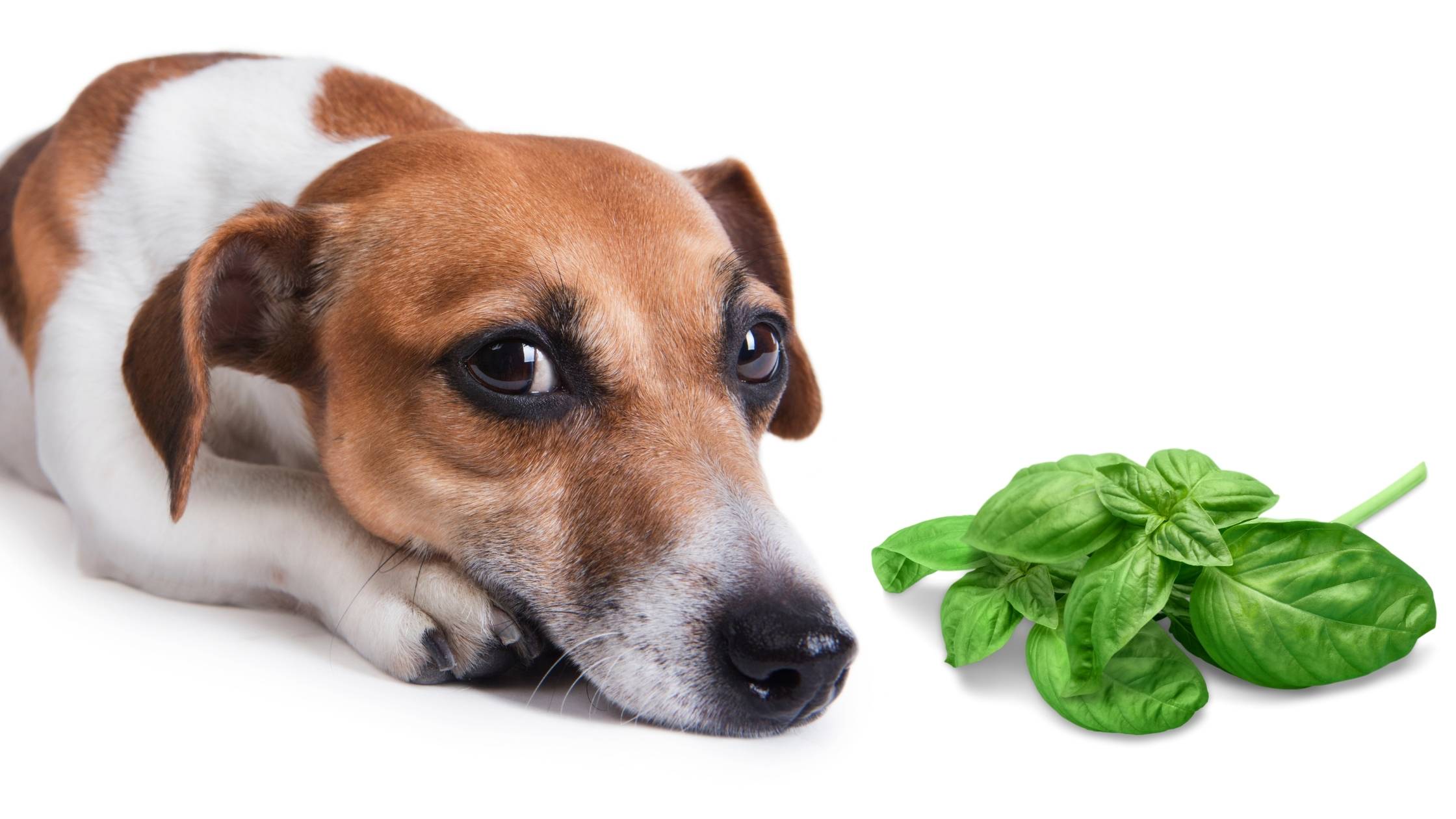Last Updated on 11/17/2021 by Veronica Jones
Humans use basil on a daily basis to add flavor to pizza, pasta and sauces, so it’s important to know whether this popular herb could cause your canine friend any harm.
Can dogs eat basil?
We explain the benefits and risks of feeding basil to your pup and reveal the types of herbs that are safe and toxic to canines.
Can dogs eat basil?
Yes, basil is a non-toxic herb for dogs. This delicious green herb can actually benefit a dog’s health if given in moderation because it’s full of vitamins, minerals and antioxidants. Can dogs eat basil leaves? Dogs can eat both basil leaves and dried basil, as long as it’s not combined with other seasonings that are dangerous to animals.
There are some negative effects that your dog may experience from consuming basil though. These can be minimized by following the advice in this article.
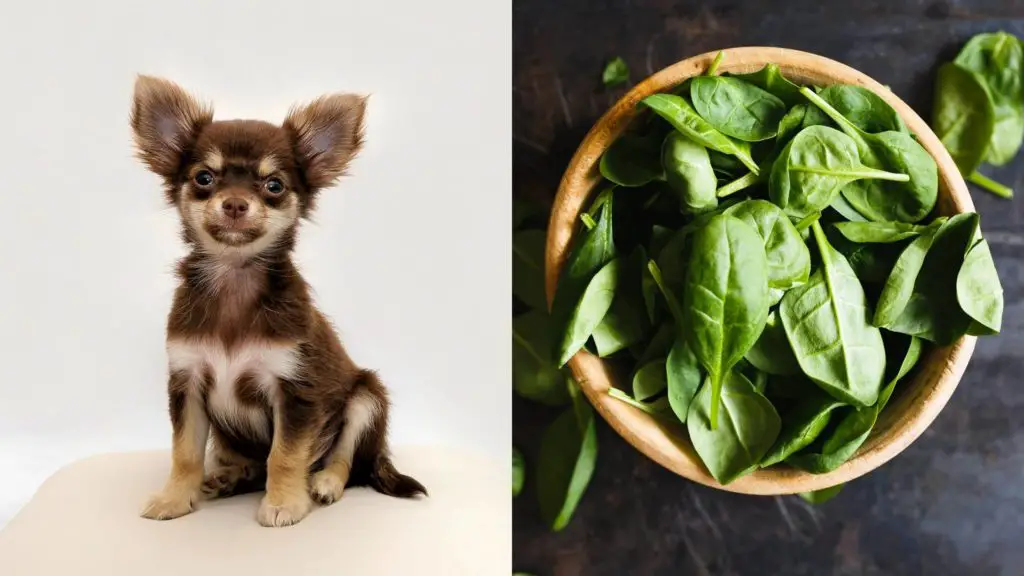
Are there any health benefits of basil for dogs?
Basil is low in calories, making it a healthier option than other things to add to your pooch’s food. Eating bail in moderation will allow your pup to experience the following health benefits.
Fights cancer – basil is bursting with antioxidants, which are known to fight types of cancer.
Prevents cell damage – this herb can also help prevent cell damage and destroy free radicals inside a dog’s body.
Reduces the risk of bowel disease – unlike prescription medicines, basil’s anti-inflammatory properties can help prevent diseases such as arthritis and inflammatory bowel disease.
Decreases anxiety – did you know that basil has calming effects? Next time your pup is anxious when going in the car or when fireworks are going off, try giving your four-legged friend some basil instead of prescribed medications or certified calming dog supplements.
Improves hydration – the water content in basil can help to ensure your pup stays well-hydrated.
Boost your pup’s overall health – vitamins A, B and C are found in basil, along with iron, calcium and potassium that all promote good health and boosts a dog’s immune system.
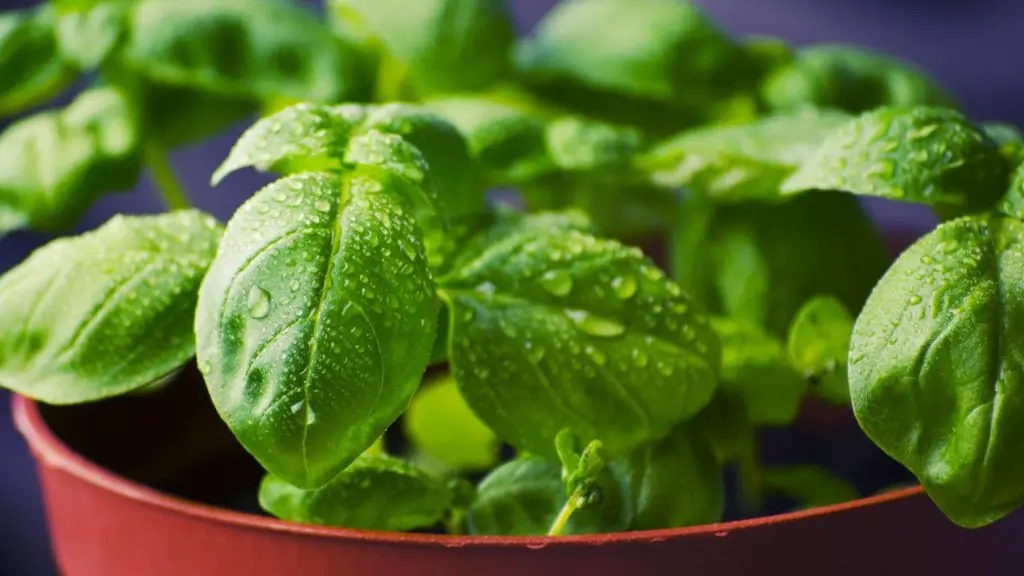
Is basil poisonous to dogs?
Whilst basil is not considered poisonous to dogs, it could cause some possible side effects if consumed by canines.
Allergic reaction – dogs can be allergic to a number of human foods and ingredients, including basil. Dog owners should be cautious about feeding their pup basil for the first time. Sneezing, swelling, skin rashes, itchy skin, vomiting and diarrhea are all common signs of an allergy. Report any allergy concerns immediately to your veterinarian so they can give the correct medical advice and treatment.
Skin problems – it’s possible that eating too much basil can lead to itchy skin for dogs.
Digestive issues – as with most foods, too much of something can cause issues such as abdominal pain, diarrhea and vomiting. Dogs are naturally carnivores, so giving them too much of a herb could upset their digestive systems.
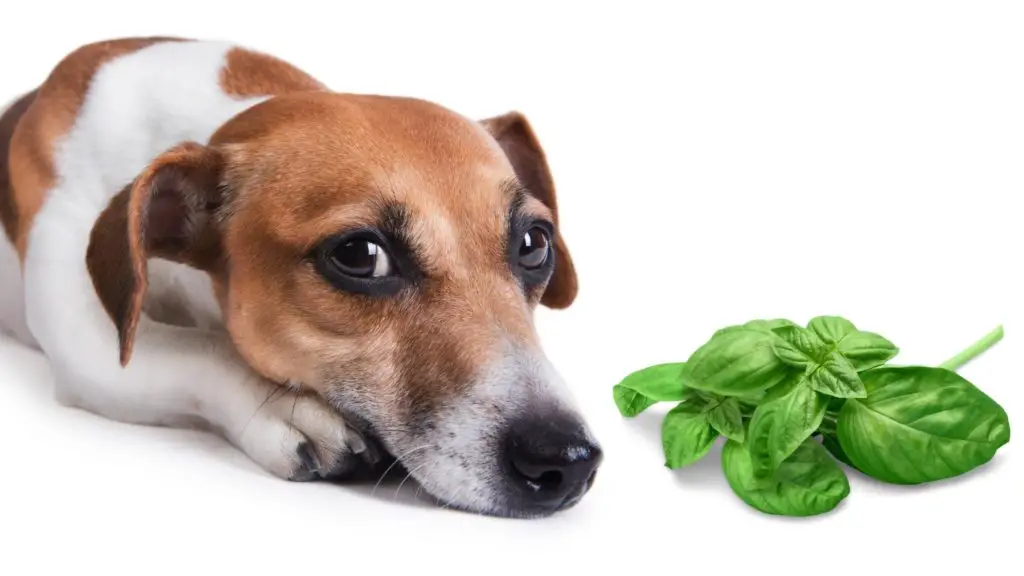
Can dogs eat roasted basil?
Yes, roasted basil is safe for doggy consumption as long as no seasoning or other products such as oil are used during the cooking process. Some seasoning such as salt can be toxic to dogs while oil is bad for a pup’s health.
Can dogs eat sweet basil?
Dogs can safely eat the sweet variety of basil. Be mindful of feeding your dog too many sweet tasting foods as this could cause your dog to develop a sweet tooth and start refusing savory foods.
Can puppies eat basil?
Whilst it’s unlikely that a puppy will come to any serious harm from eating a bit of basil, it’s not recommended because a pup needs a special diet that has been approved by a vet to help them develop and grow.
Puppies also have more sensitive tummies than a fully grown dog, so they may experience diarrhea and vomiting from eating human foods such as basil.
How to give your dog basil?
When introducing new human food to your pet, you should do so slowly and in small amounts. It’s important not to mix basil with anything else to start with, just so you can rule out an allergy that your dog may have.
Basil should not be given as a replacement to healthy dog food. Instead, try adding small amounts of the herb to your dog’s usual meal or snack. Only sprinkle small amounts to prevent any negative reactions as mentioned above.
Don’t serve basil to your pup if he starts acting unusually or has symptoms such as vomiting, diarrhea and itchy skin. If you think your pup is suffering from an allergic reaction, seek professional veterinary help.
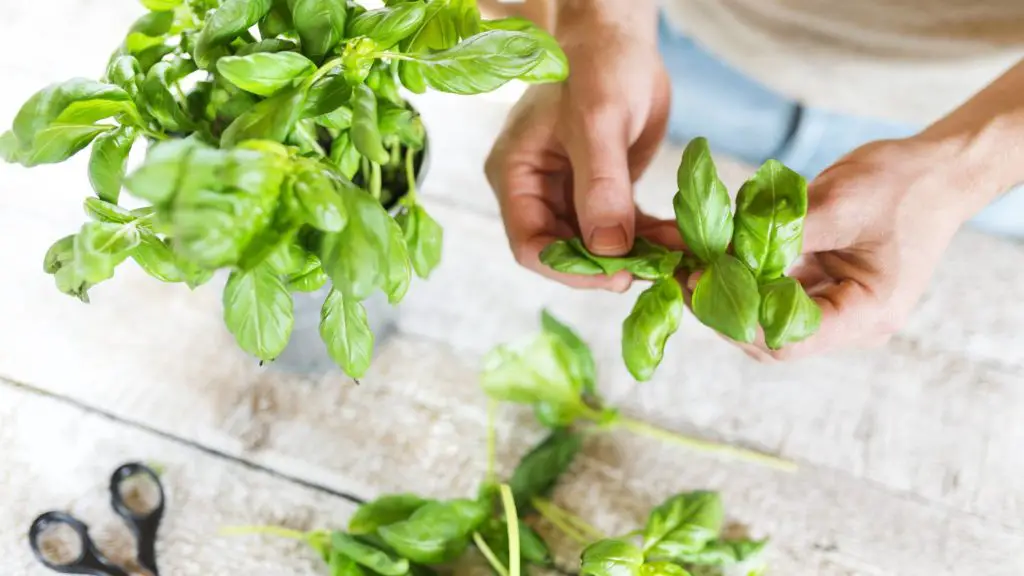
What meals can I make my pup with fresh basil?
Making your own dog food allows you to feed your dog a variety of nutritious foods that are safe for canine consumption. It’s also a lot easier than people may think. Here are a few ways to add nutritious homemade meals to your dog’s diet.
Homemade basil dog food seasoning
Fresh herbs are great in the summer when you can easily grow them in your garden, however when it comes to the winter months it’s you can use pre-made homemade seasoning instead and you and your pup can still benefit from the vitamins and minerals it contains.
Using dog-approved herbs, you can whip up some homemade dog food season in no time at all. Simply blend two tablespoons of dried parsley, dried dill, dried oregano, dried rosemary and dried basil in a food processor and store in a labeled jar. Start adding your homemade seasoning in small amounts. A pinch is enough for small dogs and a teaspoon is plenty for larger dog breeds. As a pet parent you’ll feel good that you’ve given your pup a nutrition boost safely.
Dog-friendly homemade pesto
Pesto is a dish that the whole family can enjoy. Whilst you serve it mixed into pasta for the humans in your family, your pet can enjoy it served on top of their usual dog food for additional nutrients. Never add garlic to pesto that you want to serve your pup as it’s highly toxic to canines.
Simply blend basil, pine nuts, parmesan cheese and a splash of olive oil to make dog-friendly pesto. Even though the ingredients are safe for dogs to eat, it’s advised that they should only be consumed in small quantities.
Chicken, basil and broccoli dog food
We now know that basil is great for its anti-inflammatory properties and for fighting illnesses such as arthritis and cancer. But did you know that broccoli is safe for doggy consumption and contains fiber and vitamin C? Give this chicken, basil and broccoli dish a go and top up your pooch’s intake of nutrients.
Ingredients:
• Frozen broccoli (1 cup)
• Water (1/2 cup)
• Lean ground chicken (6 cups)
• Fresh, chopped basil (2 tablespoons)
Method:
1. Add ¼ of the cup of water into a pan and add the broccoli.
2. Cook for approximately 10 minutes then drain and roughly chop.
3. Add a splash of olive oil to the same pan and cook the ground chicken thoroughly.
4. Once cool, mix in the broccoli and add the chopped basil.
Serve in your pet’s favorite bowl and watch your dog enjoy a healthy, safe and nutritious homemade meal.
What herbs are toxic to canines?
If you have the following herbs at home, keep them well out of reach of your pet pooch.
Aloe vera – another popular herb found in many households is aloe vera. This herb should not be consumed by dogs because it can cause an upset stomach, vomiting, tremors, lethargy and even depression.
Chamomile – whilst this herb has many benefits when eaten by humans, the same can’t be said for dogs. In mild cases, the consumption of chamomile in dogs can cause gastrointestinal upset. In severe cases, it can lead to chamomile poisoning. Toxicity symptoms can include vomiting, diarrhea, anorexia, hypersalivation and bleeding tendencies. Seek urgent medical attention if you think your dog is suffering from chamomile poisoning.
Chives – this herb is part of the Allium family, along with garlic and onions, all of which are highly toxic to canines. Avoid your dog coming into contact with chives.
Comfrey – dogs should not consume comfrey because it contains alkaloids that have been linked to causing cancer. Dried comfrey is safer than the fresh variety, however it can still cause digestive problems in dogs.
Lemongrass – whilst safe in pet products such as shampoo, lemongrass should not be consumed by dogs as it could cause bloating, gas and diarrhea.
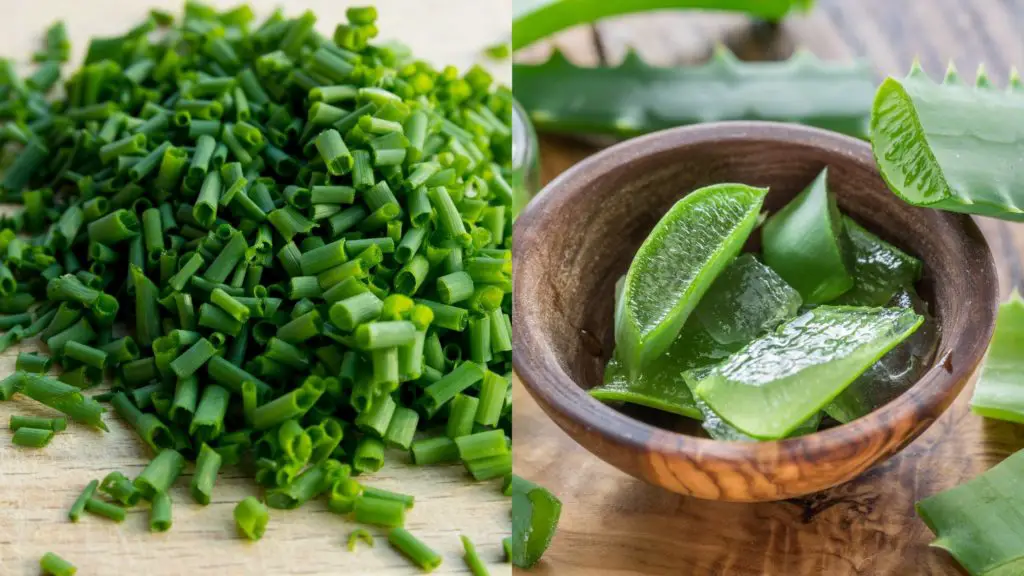
What herbs are safe for dogs to eat?
Some fresh herbs have numerous health benefits for dogs, including:
Oregano – the antibacterial, anti-inflammatory and antifungal properties in oregano make it a great herb for dogs to eat. It can also boost a canine’s immune system and promotes good digestion.
Coriander – if your pup is feeling nauseous or gassy, coriander is believed to help relieve symptoms because it has anti-diarrheal and anti-parasitic properties.
Dill – this is another herb that is pup-safe and contains antioxidants that can help prevent cancerous cells from forming in your dog’s body. Dill can also help lower cholesterol levels.
Mint – another dog-safe herb that can help soothe an upset stomach, relieve irritable bowel syndrome and reduce gas.
Thyme – this popular herb is safe for doggy consumption and can help maintain a healthy digestive tract. It can even help relieve the symptoms of an irritable bowel.
Rosemary – if eaten in small amounts, dogs can benefit from the iron and calcium found in rosemary as well as the antioxidant properties. Large amounts of rosemary in a dog’s diet can cause diarrhea, so give it to your pup in moderation.
Parsley – high in fiber and good for digestive health, parsley can be added to your pup’s usual food in small amounts. Parsley is also known to freshen a doggy’s breath.
Sage – packed full of vitamins and minerals, sage can safely be consumed by dogs. Sage is also anti-microbial and is used to treat gastrointestinal infections and to reduce bloating and gas.
Turmeric – this plant has been used in humans and dogs to help relieve the pain of arthritis, thanks to its anti-inflammatory properties.
You should always watch your dog closely when giving him a new herb to try. Signs of an upset stomach could mean that your pup’s body is reacting to the new food and shouldn’t be given anymore.

Basil and dogs
Basil is safe to add to your dog’s food if used right and given in moderation. If your pup starts showing any unusual signs after eating basil, it could indicate an allergic reaction. Not all dogs react the same way to human foods, so it’s important to watch your dog carefully and react quickly if you think he is experiencing an allergic reaction to something new that you’ve given your pet. Always contact your veterinarian if you’re concerned about your dog’s health and before introducing new foods to your pet.
Looking for More Great Articles About Dog Diet?
- Can Dogs Eat Meatballs? Are They Healthy?
- Best Dog Food for Pugs – Are You Feeding Your Pug the Right Food?
- Can Dogs Eat Orange Chicken? Is it Safe?
- Can Dogs Have Soy Sauce? Is it Toxic?
Reference list
- ASPCA “toxic and non-toxic plants for dogs” https://www.aspca.org/pet-care/animal-poison-control/toxic-and-non-toxic-plants/basil Accessed 25th October 2021
- Pet Poison Helpline “garlic and dogs” https://www.petpoisonhelpline.com/poison/garlic/ Accessed 25th October 2021
- Hills “puppy diet” https://www.hillspet.co.uk/dog-care/nutrition-feeding Accessed 25th October 2021
- Pet MD “cancer in dogs” https://pets.webmd.com/dogs/guide/dogs-and-cancer-get-the-facts#1 Accessed 25th October 2021

